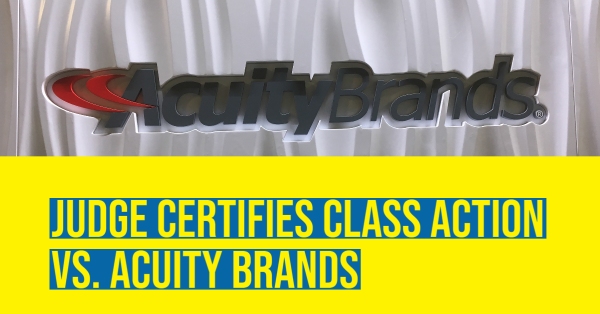Judge Certifies Class Action vs. Acuity Brands

Class action lawsuit against Acuity Brands is green-lighted to the next phase.
In 2013 - 2017, Acuity Brands experienced sales growth and stock performance that outperformed the market.
In 2018, a class action lawsuit was filed against Acuity Brands for allegedly misrepresenting to the market Acuity's ability to maintain the rate of sales growth.
If you ever listened to the earnings call of a publicly traded company and wondered why there are so many carefully worded statements and disclaimers, this is one of the reasons: companies have to manage the delicate balance of being transparent and realistic with investors while also avoiding potential legal liability if future stock performance declines.
Last week in the United States District Court for the Northern District of Georgia, an important milestone was reached in the Acuity Brands case: the Judge certified the Class Action. The parties will now proceed into the discovery phase of the lawsuit.
The court order defines the certified class as "all persons who invested in the publicly traded common stock of Acuity Brands, Inc. between October 7, 2015, through April 3, 2017 (the 'Class Period') and were damaged thereby." Additional orders included the order that Lead Plaintiff, Public Employees' Retirement System of Mississippi, is appointed as Class Representative and that the law firms of Labaton Sucharow LLP and Kessler, Topaz, Meltzer & Check LLP are appointed as Class Counsel.
The certification does not indicate any judgment from the court that Acuity Brands was involved in any of the alleged wrongdoing. A class action suit wouldn't get to this stage if it was deemed meritless or frivolous, but the main aspects of the certification relate to the case legally qualifying as a Class Action, as opposed to individual lawsuits. The judge's considerations relate to Federal Rule of Civil Procedure 23 and include:
- Numerosity: Would all of the potentially affected people filing individual lawsuits (or joinders to one Plaintiff's lawsuit) be impractical?
- Commonality: Are the claims and the way the claims arose common to those affected?
- Typicality: Are the claims of the Class Representative typical of the claims for others in the class?
- Adequacy: Evaluation of the alleged injuries being similar to all class members, potential disagreements between the class representative and other class members, etc.
So the ordeal continues for Acuity Brands. Discovery will likely give the Plaintiff access to Acuity Brands' financial reports and internal communications that otherwise wouldn't be made available. inside.lighting will continue follow the progress and major milestones of this case.
NOTE: The author of this article, Al Uszynski, was an Acuity Brands shareholder during the Class Period, but is not a party to this Class Action. The author currently holds no stock of the company mentioned in this article and has no plans to initiate a position with the company in the next 15 days.
Don’t miss the next big lighting story…Click here to subscribe to the inside.lighting InfoLetter |
